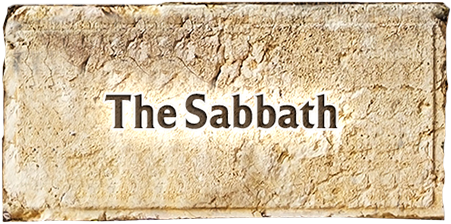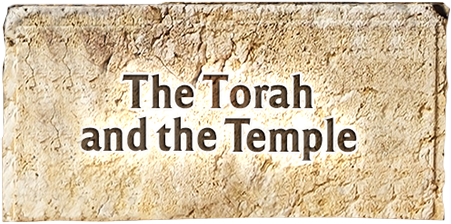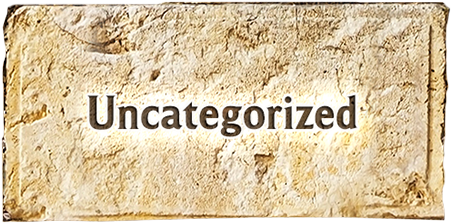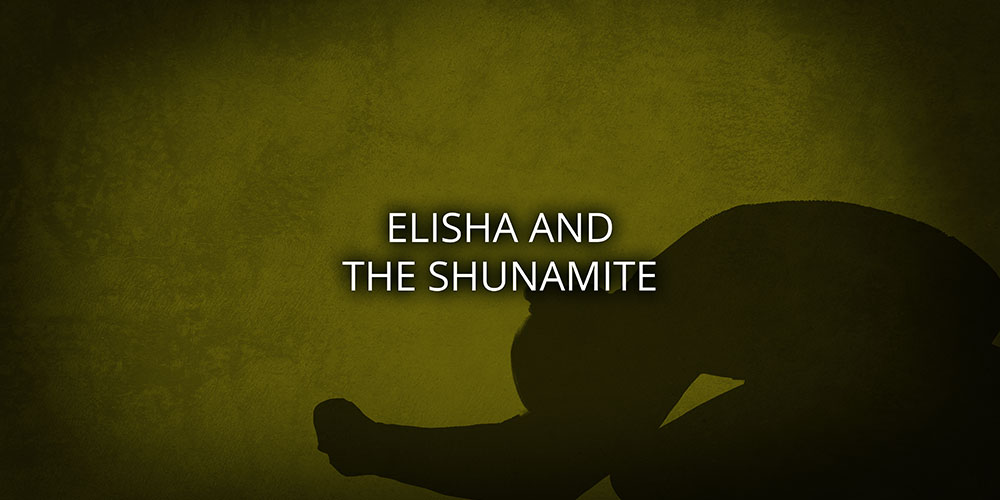Elisha and the Shunamite
II Kings 4:8-37 מלכים ב ד:ח-לג
The Shunamite woman is in deep pathos when her son dies on her lap. The depth of this pathos is one of the greatest in the Tanach. Only the Holy Spirit can reveal the depth and intensity of her grief.
And the husband’s servant carried him and brought him to his mother, and he sat on her knees until noon, and he died.
וַיִּשָּׂאֵהוּ וַיְבִיאֵהוּ אֶל אִמּוֹ וַיֵּשֶׁב עַל בִּרְכֶּיהָ עַד הַצָּהֳרַיִם וַיָּמֹת:
The Shunamite did not say anything except what Elisha the Man of God אִישׁ הָאֱלֹהִים had spoken to her.
She just repeated his words.
She could have said many other things other than what the Man of God אִישׁ הָאֱלֹהִים had spoken to her. Those other words could have kept her from receiving her miracle.
The circumstances did not cause her to loiter, but instead they catalyzed her to take ACTION and to take hold of the promise that HaShem had given to her.
She went up and laid him (her dead son) on the bed in the upper room of the man of God, and she closed about him and left.
וַתַּעַל וַתַּשְׁכִּבֵהוּ עַל מִטַּת אִישׁ הָאֱלֹהִים וַתִּסְגֹּר בַּעֲדוֹ וַתֵּצֵא:
She does not confess death, but she only confesses the original covenant.
She had a pure faith and a pure heart.
She doesn’t even tell her husband what happened. She doesn’t complain; she doesn’t argue; she doesn’t ask his permission; she only focuses on the words of the man of God.
And she called her husband and said, “Please send me one of the servants and one of the she-asses; and I will run up to the man of God and return.”
וַתִּקְרָא אֶל אִישָׁהּ וַתֹּאמֶר שִׁלְחָה נָא לִי אֶחָד מִן הַנְּעָרִים וְאַחַת הָאֲתֹנוֹת וְאָרוּצָה עַד אִישׁ הָאֱלֹהִים וְאָשׁוּבָה:
The words of the Shunamite were the same words of faith that Abraham אברהם אבינו spoke when HaShem told him to take his only son Isaac and sacrifice him on the mount.
On the third day, Abraham lifted up his eyes and saw the place from afar.
And Abraham said to his young men, “Stay here with the donkey, and I and the lad will go yonder, and WE will prostrate ourselves in worship and return to you.”
בַּיּוֹם הַשְּׁלִישִׁי וַיִּשָּׂא אַבְרָהָם אֶת עֵינָיו וַיַּרְא אֶת הַמָּקוֹם מֵרָחֹק:
וַיֹּאמֶר אַבְרָהָם אֶל נְעָרָיו שְׁבוּ לָכֶם פֹּה עִם הַחֲמוֹר וַאֲנִי וְהַנַּעַר נֵלְכָה עַד כֹּה וְנִשְׁתַּחֲוֶה וְנָשׁוּבָה אֲלֵיכֶם:
She keeps her mind and her mouth in the place of pure faith.
When her husband asks her why she is going, she says “all is well.” Shalom שָׁלוֹם
And he said, “Why are you going to him today; it is neither the New Moon nor the Sabbath.” And she said, “It’s all right. Shalom שָׁלוֹם
וַיֹּאמֶר מַדּוּעַ אַתְּ הֹלֶכֶת אֵלָיו הַיּוֹם לֹא חֹדֶשׁ וְלֹא שַׁבָּת וַתֹּאמֶר שָׁלוֹם:
She had to travel all the way to Mt. Carmel. But she did not let the distance or the difficulty of the way deter her from her purpose. She was determined. She had a single mind.
She went and came to the man of God, to Mt. Carmel; and it was when the man of God saw her from afar, that he said to Gehazi his servant, “Here is that Shunemmitess.”
וַתֵּלֶךְ וַתָּבֹא אֶל אִישׁ הָאֱלֹהִים אֶל הַר הַכַּרְמֶל וַיְהִי כִּרְאוֹת אִישׁ הָאֱלֹהִים אֹתָהּ מִנֶּגֶד וַיֹּאמֶר אֶל גֵּיחֲזִי נַעֲרוֹ הִנֵּה הַשּׁוּנַמִּית הַלָּז:
When Gehazi asks her if there is a problem, she doesn’t say anything contrary to the promise that HaShem had given to her through the man of God. All she said was “We are well.”
“Now please run toward her, and say to her, ‘Are you well? Is your husband well? Is the child well?’ “And she said, “We are well.” Shalom שָׁלוֹם
עַתָּה רוּץ נָא לִקְרָאתָהּ וֶאֱמָר לָהּ הֲשָׁלוֹם לָךְ הֲשָׁלוֹם לְאִישֵׁךְ הֲשָׁלוֹם לַיָּלֶד וַתֹּאמֶר שָׁלוֹם:
When she gets to the man of God, she falls at his feet and grabs him by the ankles. This is what we do to the Messiah Yeshua. המשיח ישוע
HaShem does not reveal the problem to the prophet Elisha because He is looking at the faith of the woman.
And she came to the man of God on Mount Carmel, and she took hold of his feet; and Gehazi approached to push her away. Now the man of God said, “Let her be, for her soul is bitter to her, and the Lord hid it from me and did not tell me.”
וַתָּבֹא אֶל אִישׁ הָאֱלֹהִים אֶל הָהָר וַתַּחֲזֵק בְּרַגְלָיו וַיִּגַּשׁ גֵּיחֲזִי לְהָדְפָהּ וַיֹּאמֶר אִישׁ הָאֱלֹהִים הַרְפֵּה לָהּ כִּי נַפְשָׁהּ מָרָה לָהּ וַיהֹוָה הֶעְלִים מִמֶּנִּי וְלֹא הִגִּיד לִי:
Then Elisha tells his servant Gehazi to take his STAFF. Why does he say his staff? Because this is the staff that David the King דוד המלך talks about in Psalm 23. It is Moses’ staff in the wilderness. It is the staff of the Messiah משיחin the face of death.
Even when I walk in the valley of the shadow of death, I will fear no evil for You are with me; Your rod and Your staff-they comfort me.
גַּם כִּי אֵלֵךְ בְּגֵיא צַלְמָוֶת לֹא אִירָא רָע כִּי אַתָּה עִמָּדִי שִׁבְטְךָ וּמִשְׁעַנְתֶּךָ הֵמָּה יְנַחֲמֻנִי:
And Elisha said to Gehazi, “Gird your loins and take my staff in your hand and go. If you meet anyone, do not greet him, and if anyone greets you, do not answer him: and you shall place my staff on the lad’s face.”
וַיֹּאמֶר לְגֵיחֲזִי חֲגֹר מָתְנֶיךָ וְקַח מִשְׁעַנְתִּי בְיָדְךָ וָלֵךְ כִּי תִמְצָא אִישׁ לֹא תְבָרְכֶנּוּ וְכִי יְבָרֶכְךָ אִישׁ לֹא תַעֲנֶנּוּ וְשַׂמְתָּ מִשְׁעַנְתִּי עַל פְּנֵי הַנָּעַר:
HaShem raises her son from the dead.
When the prophet tells her to take up her son, she doesn’t touch her son in her great joy.
She first falls down and worships HaShem.
After that she takes up her son and goes out.
And he summoned Gehazi and said, “Call this Shunemmitess.” And he called her, and she came to him, and he said, “Pick up your son.”
And she came and fell at his feet and bowed to the ground; and she picked up her son and departed.
וַיִּקְרָא אֶל גֵּיחֲזִי וַיֹּאמֶר קְרָא אֶל הַשֻּׁנַמִּית הַזֹּאת וַיִּקְרָאֶהָ וַתָּבֹא אֵלָיו וַיֹּאמֶר שְׂאִי בְנֵךְ:
וַתָּבֹא וַתִּפֹּל עַל רַגְלָיו וַתִּשְׁתַּחוּ אָרְצָה וַתִּשָּׂא אֶת בְּנָהּ וַתֵּצֵא:
The Shunamite woman was truly a virtuous woman. אֵשֶׁת חַיִל






